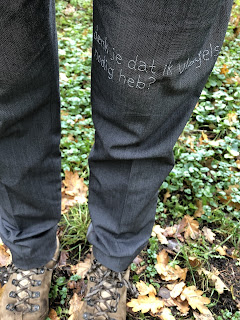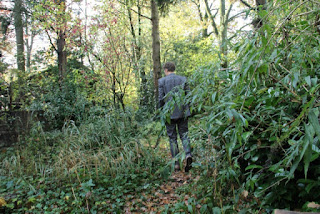I walked around in a suit locally for a year, embroidered peoples' questions on it and had many wonderful encounters. Now I am taking the suit on a long performative walk through known and unknown territories.
30/11/2021
29/11/2021
28/11/2021
27/11/2021
We are only strangers and pilgrims
Although I embroider a new question every day and I try to stay with that question, most of them keep being on my mind on other days and some questions more than others. It also makes a difference where I put them, apparently. I didn’t do it on purpose, but on the upper part of my right trouser leg I embroidered “What if there is no tomorrow?” Every time I sit down somewhere and cross my legs comfortably, I read it. It is an interesting question you can look at in two ways. Like a memonto mori, none of us is going to live forever —although some people are putting a lot of effort into changing that and who knows, maybe we will some day be able to upload our brains.
26/11/2021
24/11/2021
23/11/2021
22/11/2021
21/11/2021
How to love?
by Jeanette Winterson
I have spent most of my life thinking about love. I understood early that love could be exciting, extravagant, risky, reckless, heart-racing, heart-breaking, complete, catastrophic, desired and desperate. And I knew that love was like a scent trail and I would follow it. That love could not be a thought-experiment. That love should never count the cost. That the cost is the exchange of the self as a single currency.
I set out to fathom love because I lost it too soon– at six weeks old when I was adopted. Losing love early shapes the idea of love into its opposite: Loss.
Why is the measure of love loss?
Our binary oppositions are too crude. The opposite of love is not hate – in fact love and hate are as close as a pair of hostile brothers, as anyone who has fallen out of love – with a person or a cause, will know.
If love means to gain everything then to lose love is to lose everything.
But I don’t mean the hit or miss of another person, Love is oddly impersonal – it is a quality as well as an emotion. Nobody teaches us this quality and so we are left with the emotion –inevitably directed at another person.
What I have found is that once cultivated, like courage or self-control, love the quality is more durable than love the emotion.
When I learn how to love – and it needs both hands like playing the piano – I find that I am not waiting to find love. Match.com is irrelevant. My purpose is to love. I love.
In all circumstances? Of course not in all circumstances, anymore than courage or self-control is present in all circumstances. But I am aware that this quality of love now belongs to me. No longer on the outside waiting to be discovered (You too can find love) or worse, fallen into, like a hole in the ground. (Falling in love again)
I have had so many reckless encounters. I have never been a love-rat but I have been a love-pirRATe, jumping ship, avoiding duty, flying under my own flag. When I believed love was loss - and I believed it with poetic fatalism, there could be no genuine attachment. Attachment to another meant a rendezvous with loss. I preferred to fuck with death.
Sex is a very good way to avoid attachment. Men are better at this than women but at least they get some pleasure out of the (self) deception. For women, fucking is the new frigid. So much sex. So little intimacy. Is that freedom, do you think?
Was I free? No. I have always enjoyed sex and taken pleasure and treasure from those wooded islands I visited and those other ships passing in the night. But I was not free because I was in thrall to my private narrative of loss.
I did not know that love could be reliable like the sun; the daily rising of love.
As I get older I find that I know less and less about more and more. Also, I know more about less. I know something about love having boxed its shadow for so long. I found that the insubstantial thing I hit and hit and hit was not love; it was me.
How to love? Love is both risk and rescue mission; the princess in the tower is you. Forget the gender; the princess in the tower is you.
I had to give up the pirate ship – which was a shame in some ways when I had spent so long embroidering the flag. I had to risk the climb to the top of the tower and get the princess out and let her go. Yes, let her go, to love in her own way, freed from all the towering assumptions about love.
What now? The point is to love well, with or without an ‘object’. The sun shines, with or without an ‘object.’
And when I love you, it is for yourself, as you are, not as a trophy for my ship or as a hostage to my flag. Love increases in the company of the other, and finds itself again as an emotion - the signal emotion - when you are there. But if you are not there, then love as a quality does not desert me. And never did, though I did not know it, and many times I deserted love.
You need both hands – like playing the piano. To touch love. To hold love. To shape love on whatever wheel. To scoop up love where it falls. To climb the rope hand over hand. To find her face in the dark. To be empty-handed sometimes. To give; once for yourself once for the other. To catch the sun and throw it back again across the shadow of the ship you used to sail.
20/11/2021
19/11/2021
18/11/2021
17/11/2021
16/11/2021
15/11/2021
14/11/2021
Do you think I need wings?
Today’s question, “do you think I need wings?” comes from the elephant in the stories of Toon Tellegen. The elephant is tired of the forest. “Nothing but walking, standing, and walking again, he thought, no, that isn’t really my thing. I am going to fly.” So he did, on a beautiful day, the other animals in the forest were watching him. He aimed for a cloud and was planning to disappear behind it. He took off, flew all the way up, over the trees, passing a swallow, disappearing from sight. Then he fell down.
In later stories the elephant climbs trees obsessively. He always falls down in the end, he always tries again. “To be happy for a moment, now and then, just before I fall, I cannot do more. But maybe that is the only way to be happy, to be truely happy, and is falling a part of that."
13/11/2021
12/11/2021
For how long?
Nastia Smirnova wrote: Доколе? A very old and very dramatic Russian adverb that is simultaneously a rhetorical question. It means “for how long or until when this (usually unfair thing) will continue?”
Live the questions
I walk across the moor, into the woods, past burial mounds, through The Forest of the Dancing Trees (long ago, farmers were allowed to cut down trees for their own use and they would take the straight ones and leave the bended ones) and I think: “All the answers are here.” I am not sure what that means and if it is more than just an abstract thought. They are not written out, they are not present in my mind, they are not tangible, I can’t see them, I don’t know them.
-
What does belonging mean? What is my territory? What is yours? What do you truly own? Where is the wild? How to listen to non-human voices? ...
-
For a long time I have been thinking about walking to the COP 26, the United Nations Climate Conference in Glasgow. In 2015 I walked from Ba...
-
Writing is traveling backwards and forwards at the same time, revisiting memories and thoughts and creating new connections and insights. In...



















































.jpeg)